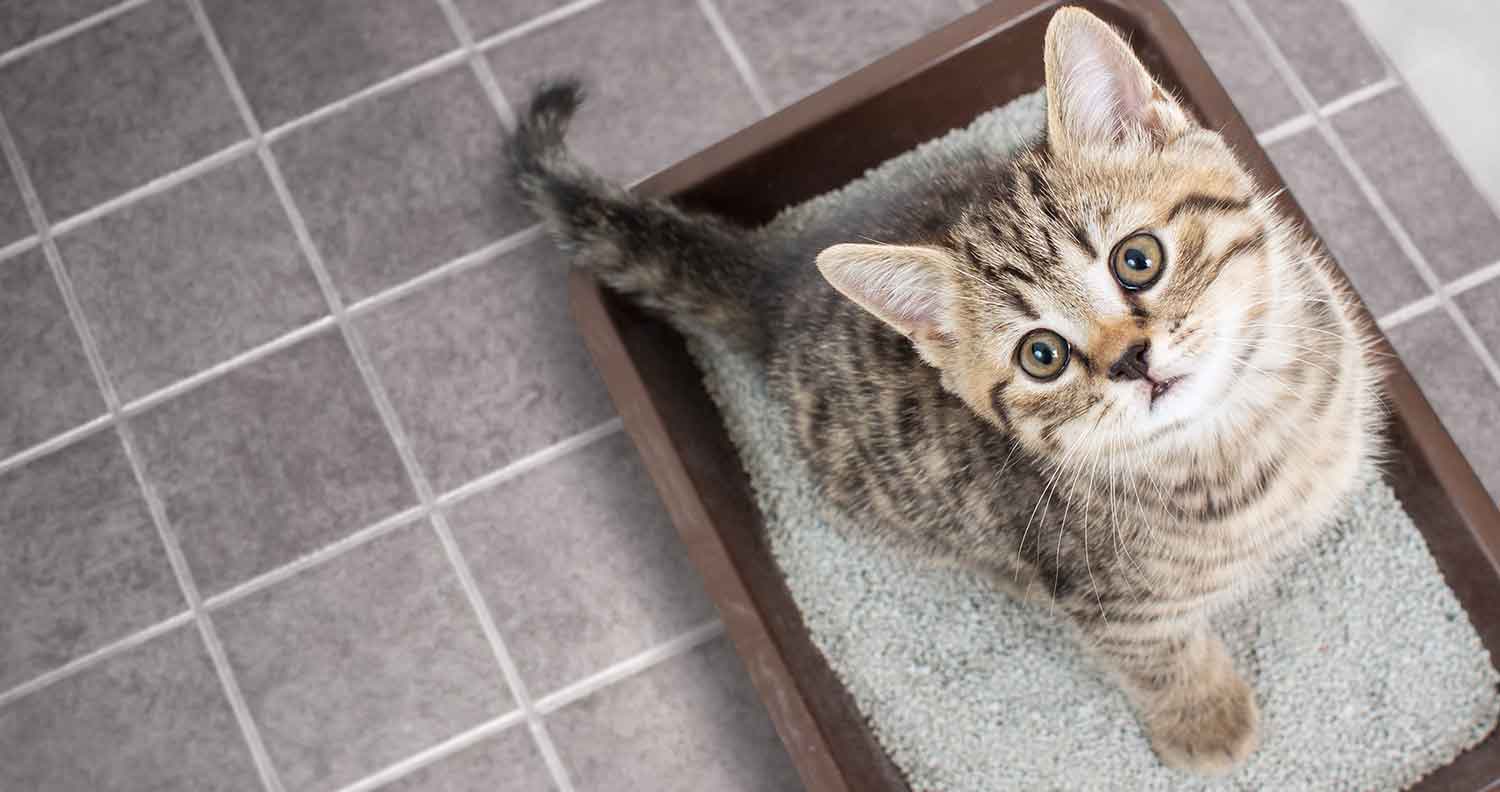No products in the cart.
Help! Why is My Cat Peeing Blood?
Share:
Have you ever done a routine litter box change and asked yourself why is my cat peeing blood? Panic stations isn’t it! Learning that your beloved feline friend is passing blood in their cat pee when they urinate is an unexpected and terrifying experience for dedicated pet owners. Blood in cat urine, known as hematuria in medical terms, can be caused by a number of underlying conditions from urinary tract issues to diseases and blockages.
The blood may be found in or around the litter box and color may vary from pale pink to bright red. It is not uncommon for hematuria to be accompanied by unusual toilet behaviors, such as frequent or decreased urination, difficulty in passing urine, or urinating in undesignated spots.
Blood in cat urine is usually a symptom indicative of an undiagnosed condition and as such, it is always important to schedule an appointment with your veterinary practitioner when you spot blood in your cat’s litter box. Learning more about hematuria and what causes it will help you know what to expect and what to ask at your vet visit.
Cat Peeing Blood? Signs to Look Out For
If your cat is suffering from hematuria, it may not be immediately noticeable even to the most discerning of fur parents. Generally, a cat peeing blood will be acting normal! Cats are notorious for their ability to mask pain and discomfort, and if your cat uses dark litter or goes outside, symptoms in their cat pee may be difficult to spot. The causes of a cat peeing blood will vary from minor to severe, making it important to detect subtle changes quickly. So how can we do this?
As unpleasant as it may be, we need to be sure to familiarise ourselves with our cats’ toilet habits. Having a good idea of how frequently they urinate and what to expect will ensure that small changes can be picked up. Crystal litter and frequent cleanings will help to stay on top of this in multi cat households.
These are some of the changes that indicate a need for attention:
Causes of Hematuria (Cat Peeing Blood)
So, the big question, what does blood in urine mean?
If your cat is peeing blood or experiencing any of the above mentioned symptoms, there is very likely an underlying condition or disease causing it. As scary as finding blood in cat urine and the litter box may be, it is usually caused as a result of some kind of urinary illness that can be treated by your vet.
Feline Idiopathic Cystitis (FIC)
The most common cause of hematuria is feline idiopathic cystitis (FIC), which is also known as Feline Lower Urinary Tract Disease (FLUTD) or Pandora Syndrome. These general terms exist because it can be challenging for medical professionals to distinguish the exact site of the infection, other than it being in either the urethra or bladder. FIC occurs when the bladder is unable to be emptied and is more commonly seen in younger male cats and in overweight cats.
There is rarely a single cause for FIC. One can usually expect multiple combining factors to result in FIC, including obesity; abnormalities in the bladder; hormone imbalances; urinary stones or other obstructions; and infections. Environmental factors, such as dirty litter boxes; changes in routine; introducing a new cat; and change in diet also play a large role in the formation of FIC.
Get 30% off and FREE shipping on cat food!
U.S.A. only
To Find out why we recommend chewy.com, click here
Aside from bloody cat urine, an increased need to urinate (known as pollakiuria), is a good indication that your cat may be suffering from FIC. While some cats may recover from FIC naturally in five to seven days, it is important to seek vet advice to rule out serious conditions and begin a treatment plan. The good news is that with the correct care, FIC is usually easily treated and establishing the cause o can help to avoid future incidents.
Obstruction and blockages causing blood in cat urine
If your cat is exhibiting signs of not being able to urinate at all, this is very possibly due to an obstruction in the urethra. Finding blood in the urine of a male cat is more common but it is certainly not impossible to find blood in the urine of a female cat. An obstruction like this occurs when some kind of matter fails to pass through the urethra and blocks urine from exiting the cat’s body. Obstructions that could block the urethra include urinary crystals, stones, urethral plugs and in less common cases, tumors.
If you suspect that your cat is unable to urinate, immediate veterinary attention is vital. Untreated obstructions can result in kidney failure and can be fatal within 24 to 48 hours.
Kidney Stones
The kidneys, bladder and urethra are all inexplicably linked and are vital for each other’s successful functioning. Kidney stones are made of calcium oxalate which crystalizes when its concentration capacity is overextended. Kidney stones are more commonly seen in older cats, as well as those who are inactive or have limited access to water. The stones often go unnoticed until they become large and severe. An x-ray or ultrasound will enable a vet to detect the stones so that they can be safely removed.

Treatment for Cat Peeing Blood
We often get asked, can blood in urine go away on its own? We simply wouldn’t risk this. If your cat is passing blood in his urine or if you suspect that a urinary condition (Cat UTI) is present, be sure to schedule an appointment with your vet to determine the best treatment options for your pet. Once at the vet, you can expect your practitioner to make use of any or all of these assessments:
Urinalysis (Cat UTI)
This is the most common diagnostic test used to detect signs of urinary tract issues in cats. A urinalysis will help to confirm the presence of diseases, such as diabetes. It will also indicate whether an infection of the urinary tract is present. Your vet may also choose to draw blood to help determine your cat’s organ functionability.
Blood tests
Your vet may also choose to draw blood to help determine your cat’s organ functionability, as well as detect cat urinary tract diseases.
X-rays
If your vet suspects that your cat may have a blockage in his urethra, an x-ray or ultrasound will very likely be performed. An x-ray will help confirm the presence of an impaction and will determine its exact size and location.
Depending on the severity, your vet will potentially perform a procedure to remove a blockage or prescribe medications and recommend care to be given at home. Your vet will also most likely advise that your cat goes on to a therapeutic or prescription food to help prevent urinary issues in the future.
Prevention of Cats Peeing Blood
When it comes to urinary conditions in cats and a cat peeing blood prevention always trumps treatment. While some causes of hematuria are unavoidable, there are certain preventative measures that owners can take to reduce their cats’ chances of contracting urinary tract infections.
Keep your cat hydrated
Ensure that your furry friends have clean water readily available from multiple sources around the house. Some cats prefer running water and may benefit from a cat water fountain. Offering good quality wet food is also an excellent way to help your kitty stay hydrated. Remember to take note of your cat’s water consumption, as failing to drink and drinking excessively can indicate that he is feeling unwell. If you suspect that your cat is dehydrated, try performing a tent test.
Offer a wholesome diet
A high protein, high moisture diet can help to prevent urinary tract infections in cats and stop them peeing blood. Be sure to supply food for the correct stage of your cat’s life, as excess minerals may contribute to crystal and stone build up.
Provide an enriching and clean environment
Keeping your cat fit and healthy through play and enrichment activities will make them less susceptible to developing urinary tract infections in the future. Good litter box hygiene, including regular thorough cleaning and multiple sources will also help to prevent urinary issues in cats.
Limit stressors
Stress can play a large role in the formation of health issues in cats. These sensitive animals can become deterred by even small changes, so if you notice a change in your cat’s urination habits, try to pinpoint if this could have been caused by a change in environment. Stressful changes include new pets, moving to a new home, having a new person living in the house and an altered schedule.
Schedule regular checkups with your vet
The more your vet sees your cat, the more they will be able to assist in pinpointing possible issues. Use your vet visits to discuss food options, eating and drinking habits and any changes that might be linked to an illness or condition.
Final thoughts on Your Cat Peeing Blood
If your cat is peeing blood, urgent action is required. While hematuria is a condition that isn’t at all uncommon in cats, it isn't one to take lightl. A cat peeing blood is usually caused by a lower urinary tract infection (cat UTI), but it can also be caused by blockages or underlying diseases. While usually not serious, a veterinary examination is needed to confirm a treatment plan and possible changes to make. If your cat is unable to urinate at all, this can be life threatening and urgent medical care is needed. While research will help you to understand hematuria in your cat and how to offer supportive care, it’s important that pet owners don’t try to treat it from home and seek a diagnosis from a vet.
Hematuria is unpleasant for both felines and cat guardians alike, but thankfully, preventative measures can be implemented. Promoting hydration, offering a wholesome diet and providing a clean and happy environment will help to limit your cat’s risk of contracting urinary tract infections and hopefully allow owners to avoid the stress of finding your adorable cat peeing blood.


Get 30% off and FREE shipping on cat supplies!
U.S.A only
To Find out why we recommend chewy.com, click here
Affiliate disclosure : We Love Cats and Kittens is a participant in several affiliate programs including the Amazon Services LLC Associates Program, and the Chewy affiliate program. These are affiliate advertising programs designed to provide a means for sites to earn advertising fees by advertising and linking to products on their sites. If you click on links in our blog posts and articles we may be paid a commission.
Share: